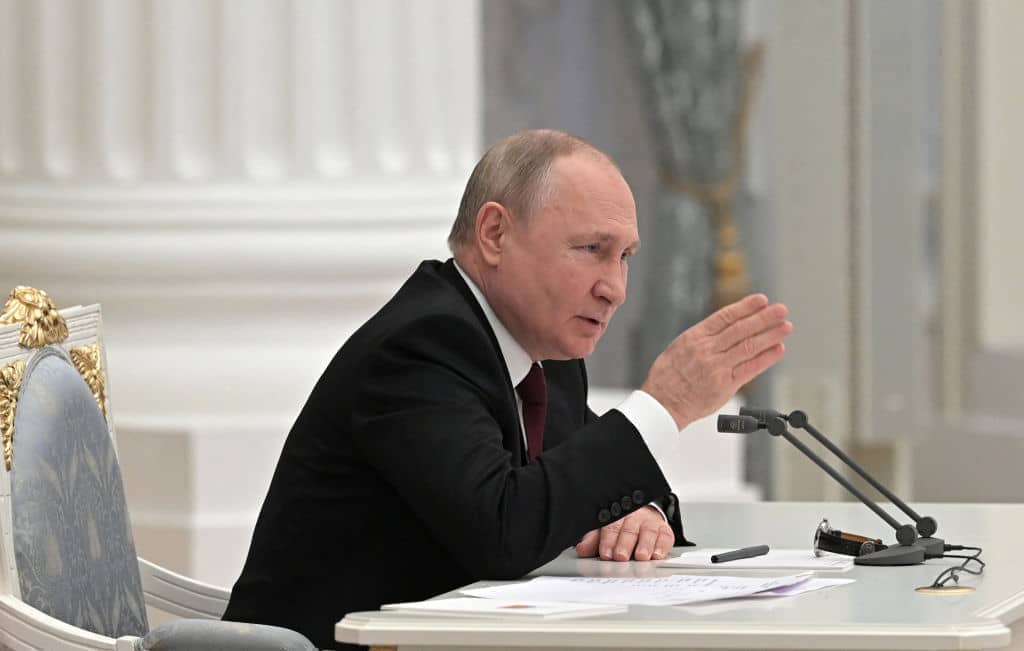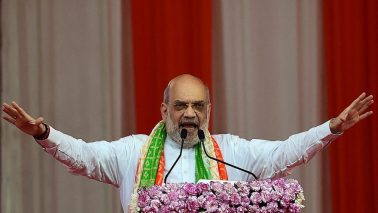Vladimir Putin does like to keep us guessing. While western governments were warning in increasingly apocalyptic terms of a full-scale invasion of Ukraine, instead he has chosen to recognise the Donbas and Lugansk pseudo-states and to send in Russian ‘peacekeepers’. Is this a step back, forward, or sideways? Only Vladimir Vladimirovich knows for sure.
The very theatricality of this conflict — already highlighted by James Forsyth — was given a new twist by a surreal meeting of the Security Council, nationally televised in which Putin forced his most powerful underlings to incriminate themselves. Some did so with genuine satisfaction, some with clear reluctance, others with sycophantic enthusiasm; all agreed in turn that the Minsk II peace process was dead and that it was time to recognise the pseudo-states.
Putin is a man who would burn down your house, but would issue himself a permit to do so first.
In part this seems to have been a piece of enforced collective responsibility — Stalin used to get the rest of the Politburo to sign execution lists — and in part a demonstrative expression of the tsar’s personal authority over his boyars. His foreign intelligence chief, Sergei Naryshkin, managed to fumble his lines and was mercilessly bullied for his pains. And when Dmitri Kozak, the troubleshooter who had actually been talking to the Ukrainians tried to express his views, he was curtly cut off.
Of course, for all that Putin was at pains to pretend this was an open exchange of views and that he would then consider all that had been said, a decision had clearly already been made, and shortly thereafter he made his announcement. But what does this mean?
The short answer is that it means whatever Putin wants it to mean. This could be just the first step to a larger war. It puts Russian and Ukrainian soldiers nose to nose, and any flare-up, whether accidental or contrived, could be used as an excuse to escalate.
His speech announcing the recognition decision was, after all, 90 per cent a rant about the iniquities of both Ukraine and Nato, two issues inextricably linked for him. He returned to his usual claim that the modern Ukrainian state was a creation of the 1917 Bolshevik revolution, when Lenin ‘tore away part of [Russia’s] historic territories’. By suggesting that Ukraine is fundamentally illegitimate, that much of its territory is made up of ‘gifts’ from Russia, he continues to raise the spectre of a concerted drive to correct that historic ‘wrong’.
It may seem strange that Putin would want or need to create some excuse to unleash his armies. However, part of his character is precisely a perverse adherence to the forms, if not spirit of legalism. This is a man who would burn down your house, but would issue himself a permit to do so first.
However, he is also a man who likes to have multiple options, and this latest move only expands his menu. He could use recognition as the basis for a limited and controlled demonstration of military might, perhaps aimed at creating a ‘security cordon’ around the pseudo-states. He could acknowledge their claim to the whole Donetsk and Lugansk regions (they only control about a third of them now).
Or he could simply try and freeze the new status quo, as has already happened with, for example, the breakaway regions of Transnistria in Moldova and Abkhazia in Georgia.
In many ways, this is actually an own goal. It kills any hopes Moscow had of forcing the pseudo-states back into Ukraine as Trojan horses, will incur yet more sanctions, and means Russia will continue to have to bankroll these corrupt and impoverished protectorates.
It may simply be that Putin fell prey to his desire to do something at a time when the political and economic costs of full invasion seemed too high. One should never underestimate his need to appear decisive and in control.
However, Russia retains its massive force on Ukraine’s borders and this could still prove just one act in a wider tragedy. Or it could turn out to be the end of the current drama. Putin is still writing his script.







Comments